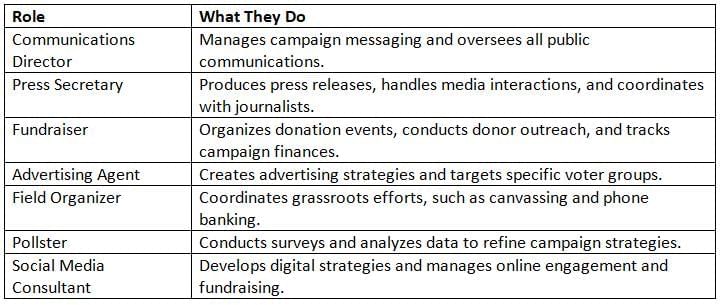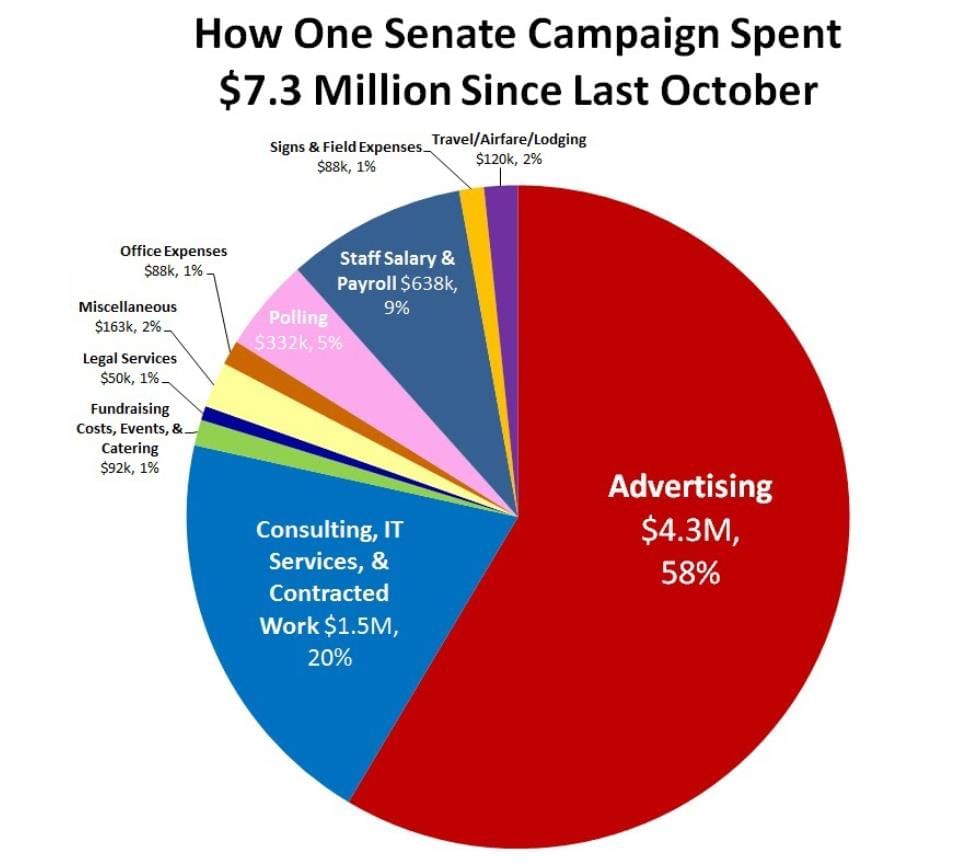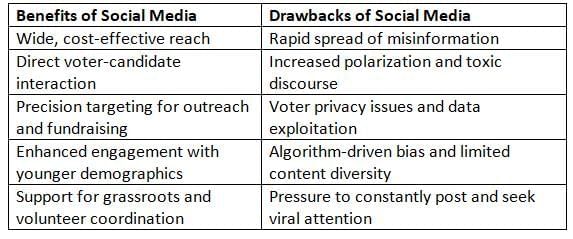Modern Campaigns Chapter Notes | AP U.S Government and Politics - Grade 12 PDF Download
| Table of contents |

|
| Introduction |

|
| Professional Consultants |

|
| Fundraising in Modern Campaigns |

|
| Duration of Election Cycles |

|
| Impact of Social Media |

|
Introduction
Contemporary U.S. election campaigns have transformed significantly from the party-driven efforts of earlier eras. Today, they rely extensively on professional consultants, digital tools, social media engagement, and substantial fundraising. These shifts bring both benefits and challenges to the democratic process, profoundly shaping how candidates connect with voters and compete for public office.
Professional Consultants
In the past, political parties largely controlled campaign operations. Now, most competitive candidates enlist professional consultants to manage strategy, logistics, and media efforts. These experts provide specialized skills but shift influence from party organizations to candidates and their teams.
Benefits of Using Professional Consultants
- Strategic expertise: Consultants bring knowledge of modern campaign tactics, tailoring strategies using voter data and polling insights.
- Consistency and messaging: Campaigns deliver unified messages across various media platforms.
- Efficient management: Specialized roles allow candidates to focus on voter interaction and public appearances.
- Rapid response: Professional teams can quickly address breaking news or counter opposition attacks.
Drawbacks of Consultant-Driven Campaigns
- High costs: Professional services are costly, often favoring candidates with significant financial resources, reducing electoral competition.
- Reduced authenticity: Overly managed campaigns may seem rehearsed or detached from voters’ concerns.
- Conflicts of interest: Consultants working for multiple clients or tied to external interests may raise ethical issues.
- Influence on democracy: Consultant dominance can shift campaign priorities away from addressing public needs.
Fundraising in Modern Campaigns
Raising funds is critical for electoral success, with campaign costs escalating, particularly for federal offices like the presidency or U.S. Senate. Candidates must allocate considerable time and resources to fundraising throughout the election cycle.

Campaigns secure funds through:
- High-profile donor events and dinners.
- Online contributions from small-dollar donors.
- Email and text-based fundraising appeals.
- Donations from Political Action Committees (PACs) and Super PACs.
- Support from membership dues and labor unions.
Platforms like ActBlue and WinRed have simplified small-donor contributions, while data analytics enhance targeting of potential donors.
Benefits of Fundraising
- Visibility: Greater funding supports increased advertising, outreach, and voter engagement efforts.
- Grassroots connection: Fundraising events and digital appeals foster direct interaction with supporters.
- Infrastructure: Funds enable campaigns to hire staff, develop voter databases, and host large-scale events.
Drawbacks of Fundraising
- Inequality: Well-funded candidates often overshadow those with fewer resources, limiting diversity in candidates.
- Donor influence: Large contributions from corporations or special interests may lead to perceived or actual conflicts of interest.
- Distraction: Time devoted to fundraising detracts from policy discussions and voter engagement.
- Public distrust: The perception that elections are influenced by money can erode confidence in democracy.
Duration of Election Cycles
The U.S. is distinctive for its lengthy election cycles, especially for presidential races. Candidates often form exploratory committees years before the election date.
- Presidential campaigns: Typically start over a year prior, involving early fundraising, media outreach, and primary planning.
- Congressional campaigns: Though shorter, often begin more than a year in advance, particularly in competitive districts.
Consequences of Long Campaign Cycles
- Voter fatigue: Prolonged political messaging may cause voters to disengage or lose interest.
- Escalating costs: Extended campaigns demand sustained fundraising and large staff commitments.
- Policy delay: Elected officials may prioritize campaign optics over governance as re-election efforts begin early.
However, longer cycles can benefit lesser-known candidates, providing time to build name recognition and support.
Impact of Social Media
Social media has revolutionized political campaigns by offering candidates direct, unmediated access to voters. Platforms such as Twitter, Facebook, Instagram, and TikTok enable real-time communication, fundraising, and organization.
Candidates can now bypass traditional media, reaching thousands or millions of supporters instantly with just a smartphone and internet connection.
Note: The Supreme Court’s decision in Citizens United v. FEC (2010) increased external campaign spending, but social media provided candidates a cost-effective alternative to expensive television ads.
Advantages of Social Media Use
- Direct engagement: Candidates can address voter concerns, clarify positions, or share personal stories without media intermediaries.
- Low cost: Organic social media posts are affordable and scalable.
- Targeting: Platforms enable precise advertising based on location, age, interests, and political preferences.
- Youth outreach: Younger voters are more likely to engage with candidates on social media than through traditional channels.
Challenges of Social Media
- Misinformation: False or misleading information spreads rapidly, with fact-checking often lagging behind.
- Negative discourse: Social media can heighten polarization, amplify attacks, and enable anonymous harassment.
- Privacy concerns: Campaigns’ use of extensive voter data raises ethical questions about privacy.
- Echo chambers: Algorithms may reinforce biases by exposing users only to content aligning with their views.
Benefits of Social Media vs. Drawbacks of Social Media

Key Terms
- Advertising Agent: An advertising agent is a professional or firm specializing in designing, planning, and managing political ad campaigns. They craft resonant messages, select media channels, and time ad releases to maximize voter impact, shaping public perception and behavior.
- Campaign Manager: A campaign manager oversees all aspects of a political campaign, including strategy, budgeting, and team coordination. They ensure the campaign achieves its objectives, managing public image and navigating the complexities of modern elections.
- Communications Director: A communications director manages a campaign’s messaging and public communication strategies. They ensure consistency across platforms, handle media relations, and enhance the candidate’s image to connect with voters.
- Duration of Campaigns: The duration of campaigns refers to the time candidates spend campaigning for election or re-election. Modern campaigns, often lasting months or years, are shaped by media, fundraising, and voter engagement strategies, allowing message refinement based on public feedback.
- Field Organizer: A field organizer leads grassroots mobilization, engaging voters and building local support. They coordinate volunteers, events, and outreach, relaying community feedback to inform campaign strategies and boost voter enthusiasm.
- Fundraiser: A fundraiser is an event or effort to raise funds for political campaigns, covering costs like advertising and staff salaries. These activities, ranging from dinners to online crowdfunding, engage supporters and drive financial contributions.
- Fundraising: Fundraising is the process of gathering resources to support political campaigns. It funds advertising, outreach, and operations, significantly influencing a candidate’s competitiveness in modern elections.
- Impact of Social Media: The impact of social media reflects its transformative role in shaping public opinion and political engagement. Platforms enable direct candidate-voter interaction, rapid information spread, and targeted outreach, while also posing risks like misinformation.
- Misinformation: Misinformation is false or misleading information spread unintentionally or otherwise. It influences perceptions and decisions, particularly in modern campaigns, impacting public opinion and information credibility.
- Political Action Committees (PACs): PACs are organizations that raise and spend funds to support or oppose candidates. They play a key role in elections, influencing outcomes through campaign contributions and shaping political dynamics.
- Pollster: A pollster conducts surveys and analyzes public opinion data to assess voter sentiments on candidates and issues. Their insights guide campaign strategies, messaging, and outreach in modern elections.
- Press Secretary: A press secretary serves as a campaign’s spokesperson, managing media interactions and disseminating information. They shape public perception and handle press inquiries, critical in media-driven modern campaigns.
- Professional Consultants: Professional consultants provide strategic expertise to political campaigns, aiding candidates in navigating complex electoral landscapes. They offer skills in media, polling, and digital strategies, essential for effective campaign management.
- Social Media Consultant: A social media consultant develops and executes digital strategies for campaigns, analyzing audiences and creating content to enhance online engagement. They shape narratives and mobilize support in modern elections.
FAQs on Modern Campaigns Chapter Notes - AP U.S Government and Politics - Grade 12
| 1. What is a candidate-centered campaign, and how does it differ from traditional campaigns? |  |
| 2. How long do modern political campaigns typically last? |  |
| 3. What role does social media play in modern political campaigns? |  |
| 4. What are some key terms associated with modern political campaigns? |  |
| 5. How has the shift to candidate-centered campaigns affected voter engagement? |  |



















